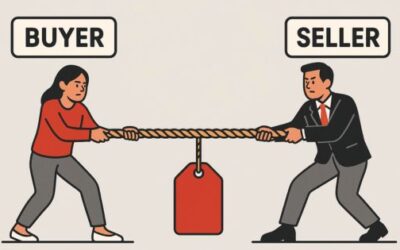Change is at the center of selling — period! No change, no sale. I’m on the record of saying this a thousand times. There will be no sale without a motivation to change. Therefore, to understand selling and to sell better you have to understand your buyer’s motives to change. People need a reason to move, to change and you need to know it.
As a salesperson, if you want to sell better, get better at finding and understanding your buyer’s motives. Why do they want to change?
Every person has their motivations for buying and for creating change and the best salespeople get good at finding the motivation.
Even though everyone has their unique motives for change, when it comes to sales you can put them into three buckets, financial, emotional, political.
Financial
Financial motives are those steeped in financial gain. Buyers want to save money or make money. It’s that simple. Money is the primary motivator for change. How your solution or product affects their financial situation will be the key determining factor in their decision making.
Emotional
Emotional motives are unique; they are the soft drivers for decision making. It can be argued, and I do argue this, the emotions are motives in every sale. For this definition, emotion is the pain associated with the current solution. How bad does the current environment hurt? How much pain is it causing the buyer? How frustrating, painful, irritating, etc. is the current situation? Freeing themselves from that pain can be a huge motivator.
Political
What are the political implications to change? Is there a promotion in it for the buyer or the influencer? Is there a demotion lurking in the wings? Is there political capital to be gained? Is there simply a genuine desire to do the right thing, which strengthens the buyers status in the organization. Motives can be political as we succeed or fail in an organization, and there can be a tremendous impact on careers and our overall happiness as a result.
These three buckets are powerful in helping categorize buyer’s motives, but to get better at selling, understanding these broad motive buckets isn’t enough. You need to go deeper. To get better at selling you have to get to each and every individual buyer’s, influencer’s, and blocker’s motivation. You have to be specific and measurable.
LESSON 4 – UNDERSTAND THEIR MOTIVATION
If you’re a Game of Thrones fan, you’re gonna get this comparison. (If not, I apologize in advance [for you not being a Game of Thrones fan LOL] and for the example). Little Finger, why is he so successful? How is it that he is still in the thick of everything that’s going on? How is it that he hasn’t had his head put on a stick yet? Everyone knows he’s snake. He has no family name. He’s not real nobility, yet he’s still smack dab in the middle of everything, executing his next move in his ascension to the Iron Throne. Why is he able to hang around?
He’s a master at understanding peoples motives. Little Finger knows what everyone wants and what motivates them, and he plays to those desires and motives. And if you want to get better at sales you need to do the same thing (minus the slimy, seedy shit he does).
To get better at sales you need to spend considerable time evaluating what it is that’s motivating the participants in the buying process. If you believe CEB and the book Challenger Customer, that’s 5.4 people. Five point four people are participating in the buying process, and each of them has their motives to adopt or not adopt the change you are proposing.
Yes, you are proposing a change, that can’t be forgotten. You have to understand what is motivating or will motivate your buyers to change.
The best path to understanding a buyer’s motivation is asking subjective, feeling questions.
“How does it make you feel when you think about the new solution?”
“It appears this is an uncomfortable position to be in, how does that feel?”
“This is exciting, do you agree?”
“How do you feel about that decision?”
“Are you comfortable with what’s happening?”
“It seems you’re struggling with certain aspects of this, could you share?”
These type of subjective feeling questions can provide a path to unlock your buyer’s motives. In many cases after asking the questions consider following up by asking “why is that?.” This solicits further clarification to their feelings, and it’s often where the motives lie. Although these are fantastic questions to help get to a buyer’s motives, my experience has shown that few salespeople are comfortable with asking them, yet when done correctly, they can provide invaluable insights.
Getting to a buyer’s motive can be hard. Often buyers aren’t’ consciously aware themselves or haven’t given them much thought. However, salesperson’s ability to understand them and influence them is critical to getting better at selling.
Take the time to figure out what’s motivating your buyers. What is it that they want to happen? What’s their vision for the future and why do they want that vision to come to fruition? What’s motivating them to change?
There is no change without a desire to change, and desire requires motivation.
Know your buyer’s motives.
If you or your organization want to start being problem-centric sellers and understanding the buyer’s motives, click here to schedule a call with our sales team.




0 Comments